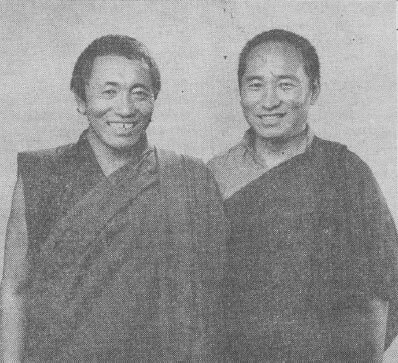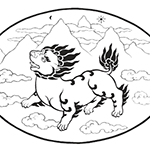| The following article is from the Autumn, 1990 issue of the Snow Lion Newsletter and is for historical reference only. You can see this in context of the original newsletter here. |
Ven. Lama Khenpo Palden Sherab Rinpoche
Ven. Lama Khenpo Tsewang Dongyal Rinpoche
In the eighth century, the Buddhist teachings were carried from India to Tibet by the great tantric master Padma Sambhava. In the 1970s and '80s these same teachings came to America. The Nyingma lineage, founded by Padma Sambhava, is being transmitted by Khenpo Palden Sherab Rinpoche and his brother Khenpo Tsewang Dongyal Rinpoche, who are currently living in New York City.
The Venerable Khenpo Palden Sherab Rinpoche was born in Eastern Tibet. Like many of the youths chosen to enter the monastic life, his training began at the tender age of six. At an early age he was trained to become abbot of Gochen Monastery. He went on his first extended retreat at age seven and has been practicing meditation for over forty years. In 1953 he entered Riwoche Monastery, one of the oldest and largest monasteries in Eastern Tibet.
In 1960, following the Communist invasion, he and his brother and their family were forced to leave the country. Both Gochen Monastery and Riwoche Monastery were destroyed by the Communist Chinese, and many people were either imprisoned, killed, or forced into exile. It took nearly a year for the family to escape and they were under constant duress. Finally, they made their way to India where they lived in refugee camps.
Soon afterwards Khenpo Palden Sherab Rinpoche began to teach Buddhist philosophy, literature, and culture to Tibetan refugees in Assam in east India. The Tibetan culture was in grave danger at that time. Being keenly aware of the situation, the refugee elders, the Dalai Lama, and the heads of the four main sects of Tibetan Buddhism joined together to preserve the culture as best as they could. Therefore, according to the wishes of the Dalai Lama, the masters of the four main sects met in Mussorie in northern India in 1965. Among them was Khenpo Palden Sherab Rinpoche on behalf of His Holiness Dudjom Rinpoche. Together they honored and cherished their ancient and rich heritage. At the same time they laid a new foundation, a strategy for preserving and passing on the teachings and traditions of the four schools.
In 1967 the Khen Rinpoche became one of the founding members of the cultural Institute of Tibetan Higher Studies at Varanasi. He was appointed Chief Abbot of the Nyingma Department where he taught classes on Abidharma, Prajnaparamita, debate, poetry, and Buddhist philosophy and psychology. He also guided the research of the students and guided the graduate program. His duties involving these positions were numerous. After six years he found himself teaching as many as fourteen classes per day. In addition, he kept up his daily duties of organizing the students and seeing to the smooth operation of the Institute.
It was around this time that Rinpoche began to focus upon a vision that he held regarding the expansion and stablization of the Nyingma tradition, not so much in the academic sense but in the area of contemplation and meditation.
He carried his dream to His Holiness Dudjom Rinpoche who offered encouragement and said he would help in any way possible. In 1972 Khen Rinpoche managed to West. By this time he had graduate students to take his place and he came to the United States on one year sabbatical in 1980.

Ven. Khenpo Palden Sherab Rinpoche (I.), Ven. Khenpo Tsewang Dongyal Rinpoche (r.)
The purpose of the visit was to share Nyingma teachings as well as the knowledge of the Tibetan culture. He taught at many colleges, universities, churches, ashrams, private groups and Tibetan Buddhist centers as arranged by Dr. Le Cocq. In the United States he worked closely with His Holiness Dudjom Rinpoche.
The situation in India at the Tibetan Institute was now quite stable. Khen Rinpoche had devotedlytrained several bright, young masters for many years, and in 1985 he felt that it was time to resign his post. The students wanted very much for him to remain, but he had great confidence in their enthusiasm and skills. He wascertain that they would carry on the Nyingma lineage in solid fashion.
Khenpo Palden Sherab Rinpoche and Khenpo Tsewang Dongyal Rinpoche moved to New York City to work with His Holiness Dudjom Rinpoche, head of the Nyingma lineage. Upon H.H. Dudjom Rinpoche's passing Khenpo Palden Sherab Rinpoche became the abbot of the Yeshe Nyingpo Center in New York City. In 1987 he resigned from this postto take up teaching and establishing Nyingma centers around America.
The Padma Sambhava Society was founded to serve as a national organization for the various centers under the direction of Khenpo Palden Sherab and Khenpo Tsewang Dongyal. They are now spiritual directors at centers in New York City, West Palm Beach, Orlando,Middle Tennessee, and Albuquerque. Khenpo Palden Sherab Rinpoche has acquired land near the University. Two books of his teachings have thus far been published in English, The Light of the Dharma and Prajnaparamita: The Six Perfections (see catalog).
Ven. Lama Khenpo Tsewang Dongyal Rinpoche is also a fully qualified lama in the Nyingma tradition. He was recognized as a Tulku soon after birth and is now a graduate of Sanskrit University. He was invested with the authority of Khenpo by H.H. Dudjom Rinpoche and presided at Orgyen Chokhorling Monastery. He also served as a teacher at the Wishfulfilling Nyingmapa Institute in Nepal where he taught Buddhist philosophy, writing, calligraphy, and poetry. He is both a poet and a scholar as well as serving as translator for teachings given by Khenpo Palden Sherab Rinpoche.He holds the complete transmissions and initiations for the Kama and Terma traditions in the Nyingma lineage.
Khenpo Tsewang Rinpoche's dynamic personality has delighted academic circles and practitioners of Buddhist philosophers around the world. His highly skilled approach bridges the ancient Nyingma tradition with contemporary Western thought.
The Khenpos are pursuing an active travel schedule teaching atall their established centers inAmerica. They also spend time each year at Sarnath working to establish the college there.
For further information the Rinpoches may be contacted through the following Padma Sambhabva Centers:
West Palm Beach .407-586-9941
Orlando 407-568-4448
Miami305-532-0706
New York City 212-255-8774
Tennessee615-653-4667
Albuquerque505-836-1947

